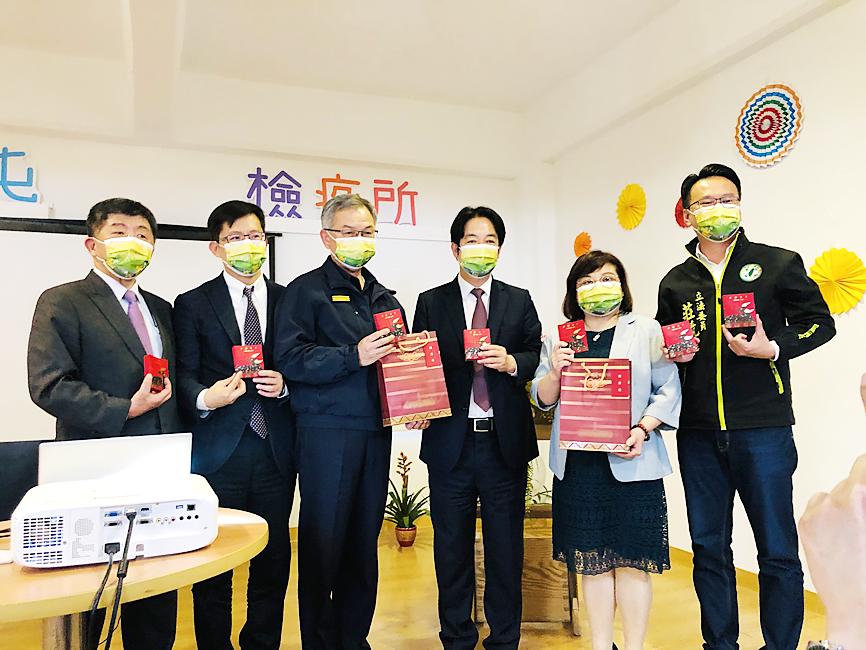The Central Epidemic Command Center (CECC) yesterday reported no new domestic or imported COVID-19 cases for the second consecutive day.
The last time the nation had no new cases for consecutive days was 109 days ago, when no cases were reported from Oct. 25 to 27 last year, it said.
Answering questions about a Vietnamese news report that a 39-year-old Taiwanese woman who arrived in Ho Chi Minh City on Jan. 28 tested positive in a second COVID-19 test on Thursday, Centers for Disease Control Deputy Director-General Chuang Jen-hsiang (莊人祥), who is the CECC’s spokesman, said the center has contacted Vietnam’s National IHR Focal Point for details.

Photo: CNA
However, it has not received any response yet, as Vietnam is also celebrating the Lunar New Year holiday, he said.
Although the case might be a false positive, the patient have contracted the disease in Vietnam or might have been asymptomatic in Taiwan, the CECC would “treat it as a domestic case and conduct contact tracing immediately,” said Minister of Health and Welfare Chen Shih-chung (陳時中), who heads the center.
“We will not let a spark become a great fire,” he said.
Chen also shared his thoughts after visiting a centralized quarantine facility in Taichung earlier in the day.
“Centralized quarantine facilities are an important line of defense against COVID-19, which can be viewed as an extension of border controls,” he said.
Chen said more than 25,000 people have stayed in centralized quarantine facilities in the past year, and 331 confirmed cases were detected among them, accounting for about one-third of all the confirmed cases in Taiwan.
High-risk people and those who have violated quarantine orders have been sent to stay at centralized quarantine facilities, he said.
Some quarantine rooms were severely damaged after people who broke home quarantine were compelled to stay at the facilities, but facility personnel calmed them down and monitored their health conditions, he added.
There would have been a risk of community spread if a few people broke quarantine, but with the help of specialized personnel at the facilities, no one broke quarantine and no cluster infection occurred, Chen said.
Giving updates on a cluster infection at Taoyuan General Hospital, Chen said 4,346 people associated with the cluster are still under 14 days of home isolation, meaning they spent the Lunar New Year holiday in isolation.
Among the 21 confirmed cases in the cluster, six have been released from isolation, six have mild symptoms, five are asymptomatic, two are on ventilators, one has pneumonia and one has died, he said.
Among 3,423 people associated with the hospital cluster who need to undergo a final polymerase chain reaction test, 3,414 have tested negative, and the remaining nine still need to be tested, he added.

Alain Robert, known as the "French Spider-Man," praised Alex Honnold as exceptionally well-prepared after the US climber completed a free solo ascent of Taipei 101 yesterday. Robert said Honnold's ascent of the 508m-tall skyscraper in just more than one-and-a-half hours without using safety ropes or equipment was a remarkable achievement. "This is my life," he said in an interview conducted in French, adding that he liked the feeling of being "on the edge of danger." The 63-year-old Frenchman climbed Taipei 101 using ropes in December 2004, taking about four hours to reach the top. On a one-to-10 scale of difficulty, Robert said Taipei 101

Nipah virus infection is to be officially listed as a category 5 notifiable infectious disease in Taiwan in March, while clinical treatment guidelines are being formulated, the Centers for Disease Control (CDC) said yesterday. With Nipah infections being reported in other countries and considering its relatively high fatality rate, the centers on Jan. 16 announced that it would be listed as a notifiable infectious disease to bolster the nation’s systematic early warning system and increase public awareness, the CDC said. Bangladesh reported four fatal cases last year in separate districts, with three linked to raw date palm sap consumption, CDC Epidemic Intelligence

Taiwanese and US defense groups are collaborating to introduce deployable, semi-autonomous manufacturing systems for drones and components in a boost to the nation’s supply chain resilience. Taiwan’s G-Tech Optroelectronics Corp subsidiary GTOC and the US’ Aerkomm Inc on Friday announced an agreement with fellow US-based Firestorm Lab to adopt the latter’s xCell, a technology featuring 3D printers fitted in 6.1m container units. The systems enable aerial platforms and parts to be produced in high volumes from dispersed nodes capable of rapid redeployment, to minimize the risk of enemy strikes and to meet field requirements, they said. Firestorm chief technology officer Ian Muceus said

MORE FALL: An investigation into one of Xi’s key cronies, part of a broader ‘anti-corruption’ drive, indicates that he might have a deep distrust in the military, an expert said China’s latest military purge underscores systemic risks in its shift from collective leadership to sole rule under Chinese President Xi Jinping (習近平), and could disrupt its chain of command and military capabilities, a national security official said yesterday. If decisionmaking within the Chinese Communist Party has become “irrational” under one-man rule, the Taiwan Strait and the regional situation must be approached with extreme caution, given unforeseen risks, they added. The anonymous official made the remarks as China’s Central Military Commission Vice Chairman Zhang Youxia (張又俠) and Joint Staff Department Chief of Staff Liu Zhenli (劉振立) were reportedly being investigated for suspected “serious